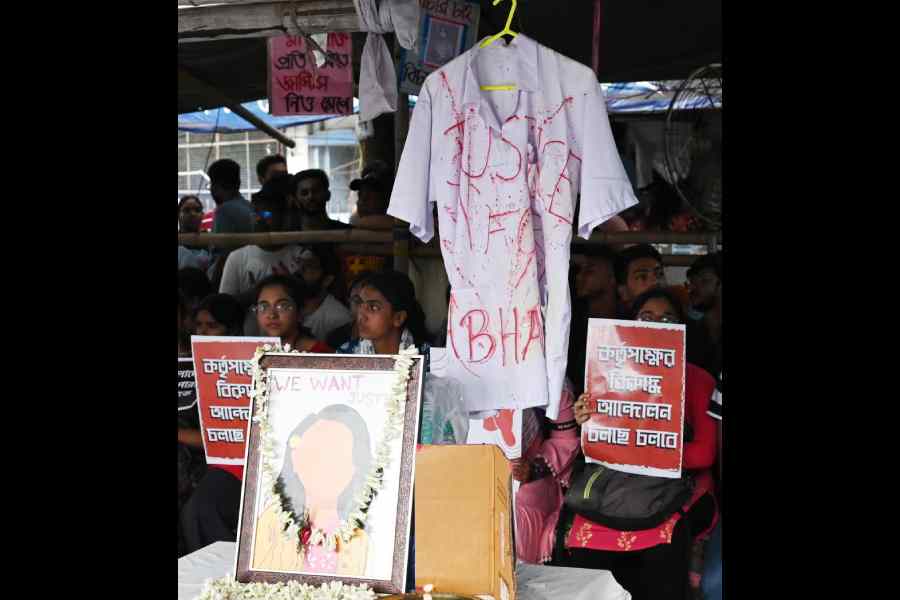Take back their jobs?
A strong reaction has greeted the set of 17 guidelines that the Bengal government has issued on women’s safety following the rape and murder of the junior doctor at RG Kar Hospital on August 9.
The guideline that calls for minimising night shifts for women has drawn the sharpest criticism. “An effort will be made to exempt women from night shifts wherever and to whatever extent possible,” it says.
This is based on the same regressive attitude towards women that the guidelines are apparently meant to fight, say its critics. Why should women be removed from the workplace, or workforce, when the source of the violence is the workplace?
“This proposal is short-sighted, regressive and damaging,” says a statement issued by Nari Dibas Udjapan Mancha, a group that addresses the concerns of women
in different professions.
“The government’s duty is to ensure that women should be able to work anywhere in the state safely and with dignity. As doctors, nurses, Asha workers, gig workers, journalists or social workers, women need to work in different professions during the night. If their work hours are reduced, many women will lose their jobs and income,” the statement adds.
“Most of all, women have the right to work at night. Why should this right be
taken away because of the failure of the police and administration? This proposal is against women’s rights.”
Sarmistha Dutta Gupta, writer and social activist, said: “I am shocked beyond words at the issuance of such a regressive guideline.”
This helps shift the focus from the “deep-seated corruption and misogyny in the healthcare system which we need to look in the eye more than ever before”, she said.
She asked which night shifts were being looked at. “While minimising night shifts of women doctors, would the government also be minimising night shifts for female attendants, nurses, sweepers and security staff? If so, then who would take care of female wards at night?”
And if the reduction in night shift is only for women doctors, then this guideline smacks of selective safety for a particular class of women.
The junior doctor — a postgraduate trainee — was found dead in the seminar hall of RG Kar Hospital in the early hours, when she was on duty. The guidelines were released eight days later, on Saturday, after a meeting of senior state government officials, as part of a programme called Rattirer Sathi (Companion for the Night), meant to create a safe workplace for women who work night shifts.
The demand for safety for women has to be made equally for every workplace, says labour activist Naba Dutta. The solution certainly lies not in restricting women’s work or by removing women. “In any case, West Bengal has fewer women in the workforce compared with other Indian states,” Dutta, who has worked for decades for the rights of women wage workers, said.
Night shifts can be a double-edged tool that managements use against women. Women are asked to overlook safety concerns at the workplace and join night shifts. If not, they do not get work, Dutta stressed.
“In West Bengal, there are about 18,000 factory establishments and several thousand other workplaces. Very few of them have the internal committee to address sexual harassment. The number can be counted on one’s fingers,” Dutta said.
In the jute industry, the workplace hardly gives women working night shifts a private place to change. In most instances, there are no separate toilets, and women are often not able to go to toilets used by men.
“As a result, women workers do not go to the toilet and develop urinary tract infection. This is true of the bidi industry as well, a recent research shows,” Dutta said. “If the government asks women not to join work, it only shows the administration’s failure to deal with crime against women.”
Dutta welcomed the first guideline that talks about separate toilets for women. Other guidelines talk about women working together (which may not be possible; are men ever asked to do that?) and the introduction of the Rattirer Sathi app.
One guideline talks about the “Vishaka Committee” for the redress of sexual harassment at the workplace. This has come in for severe criticism, too, as a bit of an anachronism.
The Vishaka Guidelines were stipulated by the Supreme Court in 1997 and superseded by the Sexual Harassment of Women at Workplace (Prevention, Prohibition and Redressal) Act, or PoSH Act, in 2013.
The passage of time seems to have been overlooked by the authors of the Rattirer Sathi. Or perhaps framing guidelines for women does not deserve too much attention.
“It is really positive that there is a push for the sensitisation of all workplaces. However, this should be implemented under the PoSH Act, 2013, and all formal and informal places of work should be held accountable by the Act,” said Amrita Dasgupta of Swayam, a Calcutta organisation that addresses violence against women.
“Pushing for less night shift for women will automatically lead to a gender divide and backlash against women. We should work towards creating safe spaces for all instead of reducing women’s mobility.”











